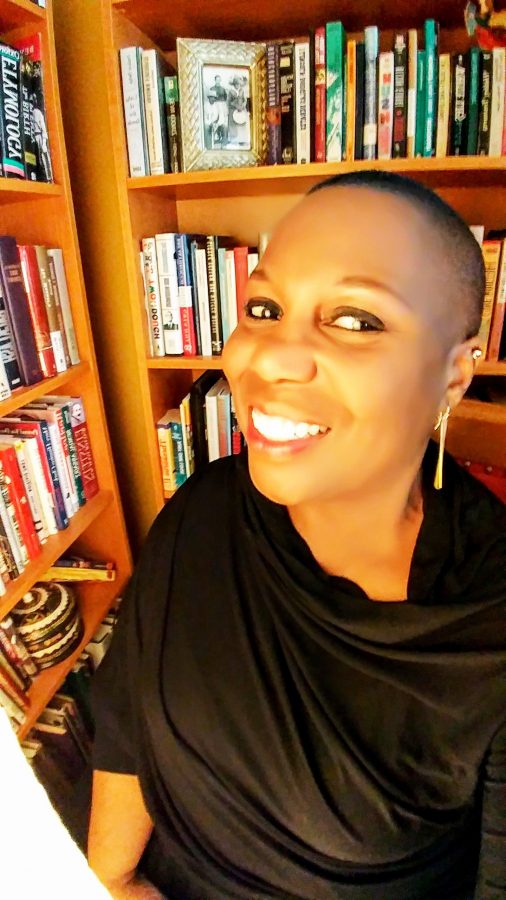Lecturer, Author, Mom
Dr. Bertice Berry came and spoke at CWU as a part of the 9th Annual Leadership Conference
February 26, 2017
 Bertice Berry will be the featured keynote speaker for the Center of Leadership and Community Engagement’s (CLCE) 9th Annual Leadership Conference. The theme for this conference is “The
Bertice Berry will be the featured keynote speaker for the Center of Leadership and Community Engagement’s (CLCE) 9th Annual Leadership Conference. The theme for this conference is “The
Best You Can Be: Snapshots of Leadership, Work and Purpose” and will focus on teaching students how to become leaders no matter what their major is.
Berry will use her background in comedy and leadership, as well as her experience dealing with social justice issues, to empower CWU students.
She has hosted “The Bertice Berry Show” and “USA Live” and made appearances on shows like “The Tonight Show with Jay Leno,” “20/20,” “Tell Me More” and the “Oprah Winfrey Show.” Berry is also the author of several bestsellers, including her memoir “I’m On My Way, But Your Foot Is On My Head” and “Sckraight From the Ghetto, You Know You’re Ghetto If…”
Berry’s leadership experience began during her time as an undergraduate student at Jacksonville University. She first worked as a resident assistant and then she worked with the dorm and university courts. During her time at school she noticed that there was a lack of diversity around her campus.
“I lived in an environment where not even 1 percent of the population was African-American on the campus that I went to. So we recognized that if we were going to have our voices heard we needed
to be more involved,” Berry said. “So I began studying how to have an impact when you are not the majority, and how to have an impact everywhere you are and everything you do.”
While she was studying to get her doctorate at Kent State University in Ohio, Berry specialized in various different subjects. Her main area of study was stratification—the unequal distribution of power, wealth and status in society. Berry said that she wanted to study stratification because she wanted to help level the playing field for everyone.
Berry began teaching sociology and statistics at Kent State University after graduating and during that time she applied and won two Fulbright Scholarships which took her to Nigeria. After getting back from her second trip, a colleague suggested that she try her hand at comedy, so she went to a comedy club in Cuyahoga Falls, Ohio for her first stand-up performance.
“At the time, Amateur Night was really comedians who were just trying to make 50 bucks and so I got up and did some stuff that I wrote down and I won,”Berry said. “I thought it was odd because I was using that time to talk about social issues.”
This led Berry to begin incorporating more comedy into her lectures to try to help people learn.
“I like this idea of using humor to address issues because if people are laughing they are more likely to listen to change,” Berry said.
For a time, Berry would do stand-up at night and lecture in the morning; however, she started disliking all of the driving and the “smoky, drunk clubs” that she would have to perform in. She quit doing stand-up and continued teaching. Though her experience with comedy did help her become a very popular professor.
According to her personal website, the university had to find bigger lecture halls for her classes to accommodate the larger amount of students in attendance.
“I like to say that instead of using statistical analysis—which no one really wants to know—I use something that is interesting, funny or bizarre and people are more likely to listen and to
learn,” Berry said.
Berry no longer teaches at Kent State, but she still guest lectures and helps with workshops
and retreats with over 200 corporations and associations a year.
When she is not speaking at workshops or retreats, she is helping out with various volunteer operations including feeding the homeless, working with people in nursing homes, giving
funds to families in need and extending her workshops to people who may have trouble paying.
Berry’s philosophy on volunteering is that while writing a check is important, it is also important to be hands on.
“For example, I spoke to [about] 3000 people on Friday for a King’s day celebration and everybody [comes up] and they want your autograph, they want a picture and they want to talk to you. Then I go home and I wake up at 5 o’clock in the morning, put on my ugly dress and drive downtown to feed people who are hungry and without [necessities],” she said. “I think it’s a great kind of equalizing experience when you put your hands on a problem and not just stand back and talk about the problem.”
This belief also extends to college students.
When she learned that she was going to be speaking at CWU, Berry did some research on what the school was like and while she was researching she was inspired by “Sweet Cases” created by Starlett Burnett, a CWU graduate and former foster child.
“She took this very personal feeling and created…these beautiful bags for 30 kids,” Berry said. “I think if we all go from where we hurt and what we see and do something about it we have a tremendous impact.”
Family also plays an important part in Berry’s life and how she got to where she is today, when she was a kid she had six brothers and sisters and a single mom and even though they struggled with extreme poverty there was a huge focus on education and excellence.
She uses those same standards now with her five adopted children, because she wants to make sure that they are striving for their goals and becoming better people.
“Quite frankly, research bears out that the kid who can wait just a little bit longer, gets what they desire not what somebody wants for them,” Berry said.



